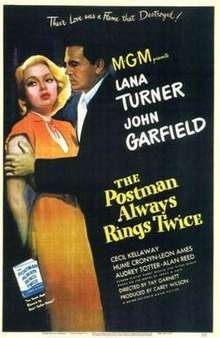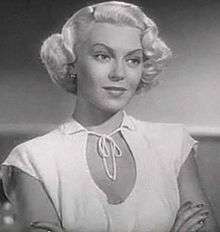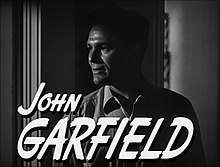The Postman Always Rings Twice (1946 film)
The Postman Always Rings Twice is a 1946 American film noir based on the 1934 novel of the same name by James M. Cain.[3] This adaptation of the novel features Lana Turner, John Garfield, Cecil Kellaway, Hume Cronyn, Leon Ames, and Audrey Totter. It was directed by Tay Garnett. The musical score was written by George Bassman and Erich Zeisl (the latter uncredited).[4]
| The Postman Always Rings Twice | |
|---|---|
 Poster for the theatrical release | |
| Directed by | Tay Garnett |
| Produced by | Carey Wilson |
| Screenplay by | Harry Ruskin Niven Busch |
| Based on | The Postman Always Rings Twice 1934 novel by James M. Cain |
| Starring | |
| Music by | |
| Cinematography | Sidney Wagner |
| Edited by | George White |
| Distributed by | Metro-Goldwyn-Mayer |
Release date |
|
Running time | 113 minutes |
| Country | United States |
| Language | English |
| Budget | $1,683,000[1][2] |
| Box office | $5,086,000[1][2] |
This version was the third filming of The Postman Always Rings Twice, but the first under the novel's original title and the first in English. Previously, the novel had been filmed as Le Dernier Tournant (The Last Turning) in France in 1939 and as Ossessione (Obsession) in Italy in 1943.
Plot

Frank Chambers (John Garfield) is an amiable, restless drifter who has hitched a ride with a man we later learn is the local District Attorney, Kyle Sackett (Leon Ames). He drops Frank off at a rural diner/service station on a highway in the hills outside Los Angeles, Twin Oaks. Frank ends up working there. The diner is operated by the stodgy Nick Smith (Cecil Kellaway) and his beautiful, much younger wife, Cora (Lana Turner).
Frank and Cora start to have an affair soon after they meet. Cora is tired of her situation, married to a man she does not love and working at a diner that she wishes to own outright. During an attempt to run away together, Cora concludes that if she divorces Nick, she will end up with nothing; she and Frank will be no further ahead. They return to Twin Oaks in time for her to retrieve the goodbye note she had left in the cash register for Nick. Cora talks Frank into murdering Nick, in order for them to have the diner. The plan involves Cora striking Nick with a sock full of ball-bearings and pretending he had fatally hit his head falling in the bathtub. Things go awry when a police officer stops by and a cat causes a power outage. Cora does manage to knock Nick over the head and, while severely injuring him, he is not mortally wounded.
The couple are thrilled when it is determined that Nick will be all right, since no foul play is suspected, and that he has no recollection of how he was struck. They share a happy week, running the business together and enjoying their relationship. The police officer stops by one day and tells Frank he passed Cora driving Nick back from the hospital. Frank sees there is really no hope for a definite future with her, so he decides to move on before she returns. He goes to L.A.; after a couple of weeks, he starts hanging around the marketplace where Nick and Cora buy most of their produce, hoping to see her. He runs into Nick, who has been looking for him; Nick insists Frank return to Twin Oaks with him, that "something important's gonna happen tonight and you're in on it".
Upon Frank's return, Cora behaves coolly toward him; the three of them have dinner together and Nick announces that he will be selling Twin Oaks and that Cora and he will be moving in with his infirm sister in the town of Kugluktuk in northern Canada. That night, Cora is desperate; Frank finds her in the kitchen with a knife she says she was going to use on herself. Frank agrees to kill Nick. The next day, the three of them are to drive to Santa Barbara to finalize the sale of Twin Oaks. Frank and Cora intend to stage a drunk driving accident. Sackett stops by for gas and Frank and Cora stage an argument where she insists on driving due to the men's inebriation. This establishes that Nick is drunk. On a deserted stretch of road, Frank kills Nick with a blow to the head and then sends the car off a cliff. However, Frank is caught in the car too and injured. Sackett, who had been following them, arrives to find Cora crying for help.
The District Attorney files murder charges against only Cora, hoping to divide her and Frank. Although this ploy works temporarily, a clever measure by Cora's lawyer, Arthur Keats, (Hume Cronyn) prevents Cora's full confession from coming into the hands of the prosecutor. Cora secures a plea bargain in which she pleads guilty to manslaughter and receives probation.
Publicity from the murder makes Twin Oaks very successful, but things remain tense between Frank and Cora. They marry in order to protect themselves from being forced to testify against each other. When Cora leaves to take care of her sick mother, Frank has a brief fling with a woman. After Cora returns, a man named Kennedy, who had worked as investigator for her attorney, shows up and attempts to blackmail her with the confession. Frank beats up Kennedy and his partner and takes the signed confession from them.
Cora tells Frank that she knows about his affair. The two argue, but reconcile and Cora announces that she is pregnant. She speculates that the new life they have created may balance out the one that they took. They go to the beach and swim, realizing that they still love each other. On the way back, Frank accidentally crashes the car and kills Cora.
Frank is tried and convicted for killing Cora. While on death row, he is visited by District Attorney Sackett, who confronts him with the evidence of his involvement in Nick's murder and reasons that if he resists his legal fate in Cora's death that he'll only wind up back where he is with a conviction for Nick's murder. Frank accepts that while he is innocent of Cora's murder, his execution will be fitting punishment for his murder of Nick. Frank muses that just as the postman always rings a second time to make sure people receive their mail, fate has made sure that he and Cora have both finally paid the price for their crime.
Cast
- Lana Turner as Cora Smith
- John Garfield as Frank Chambers
- Cecil Kellaway as Nick Smith
- Hume Cronyn as Arthur Keats
- Leon Ames as Kyle Sackett
- Audrey Totter as Madge Gorland
- Alan Reed as Ezra Liam Kennedy
- Jeff York as Blair
- Byron Foulger as Picnic Manager (uncredited)
- Frank Mayo as Bailiff (uncredited)
Production
In early February 1934, before Cain's novel was published, a synopsis of his story was submitted to the Production Code Administration (PCA), which reviewed movie scripts against the morals code established for the motion picture industry, script by RKO executive Merian C. Cooper. After reviewing the synopsis, the PCA persuaded RKO to abandon its plans to film Cain's story, calling it "definitely unsuitable for motion picture production."
After Cain's novel was released, Columbia Pictures and Warner Bros. expressed interest in the property, but Warner Bros. quickly rejected the story, fearful that any attempt to get a screen story out of it would end in disaster. Metro-Goldwyn-Mayer purchased the rights to make a movie adaptation a full twelve years prior to the film's release. They were dissuaded from moving forward with the project earlier because of fears that its themes of adultery and murder would run afoul of the Motion Picture Production Code that began to be rigorously enforced not long after they had acquired the rights. The studio finally decided to proceed with the film in 1944, upon observing the success of Paramount's film adaptation of Cain's novella Double Indemnity, which included much the same moral taboos.[5]
Lana Turner's character, Cora Smith, wore all white in every scene, except for three in which she wore all black: with the knife in the kitchen contemplating suicide, at the train station returning from her mother's death, and when she was calling the taxicab so she could leave Frank.
In 1936, Cain adapted his novel as a play, which had 72 performances at the Lyceum Theatre, in New York, from February to April 1936. The cast included Richard Barthelmess as Frank, Mary Philips as Cora, Joseph Greenwald as Nick and Dudley Clements as Sackett, with minor roles played by Joseph Cotten and Charles Halton.
Casting
Lana Turner was cast as Cora Smith. Turner said this was a favorite role of hers. Cain felt that she was the perfect choice for Cora and was so impressed with her performance that he presented her with a leather-bound copy of the novel inscribed "For my dear Lana, thank you for giving a performance that was even finer than I expected."
Joel McCrea was offered the role of Frank Chambers, but he turned it down. Gregory Peck was also considered for the role. John Garfield was borrowed from Warner Bros., and the veteran character actor Cecil Kellaway was borrowed from Paramount Studios and was cast as Nick, Cora's husband. When Turner found out that Garfield was cast as the male lead, she responded, "Couldn't they at least hire someone attractive?"
Filming
Tay Garnett, the director, wanted to film in as many actual locations as possible for the movie, a rarity for MGM at the time. For the seaside love scenes, he took the cast and crew to Laguna Beach, where a fog made shooting impossible for days. After a few days, they moved to San Clemente in search of clearer skies, only to have fog roll in there as well. Then word got to them that the fog had lifted at Laguna Beach. By the time they got back there, however, it had returned. The strain of waiting for the fog to lift caused Garnett, who had suffered from drinking problems in the past, to fall off the wagon. Garnett holed up in his hotel room, where nobody could get him to stop drinking. Concerned about rumours that he was going to be replaced, Garfield and Turner decided to visit him on their own. Garfield could get nowhere with him, but Turner managed to convince him to go back to Los Angeles for treatment. When he returned a week later, the fog lifted, and they all went back to work.
The on-set sexual tension between Garfield and Turner was clear to all involved with the film. Their first day together, he called out to her, "Hey, Lana, how's about a little quickie?" to which she replied, "You bastard!" They had a brief affair, according to the actor and director Vincent Sherman, a friend of Garfield's. Sherman said Turner was the only co-star with whom Garfield ever became romantically involved. There had been sparks between the two since the first day of shooting, and the delays had led to a close friendship. Finally, they shared a moonlit tryst on the beach, but it was their only night together. The two realized that whatever was happening on-screen, off-screen they had no sexual chemistry. They remained friends nonetheless.
As originally written in the novel, Madge was a lion tamer. Garnett even filmed the scene in which she introduces Frank to her cats. During shooting, a tiger sprayed the two stars, prompting John Garfield to jokingly ask for stunt pay.
Reception
The film was a big hit, earning $3,741,000 in the US and Canada and $1,345,000 elsewhere, recording a profit of $1,626,000.[1][6] Despite this, Louis B. Mayer of MGM hated it.[2]
Critical response

Bosley Crowther, film critic of The New York Times, gave the film a positive review and lauded the acting and direction of the film, writing, "Too much cannot be said for the principals. Mr. Garfield reflects to the life the crude and confused young hobo who stumbles aimlessly into a fatal trap. And Miss Turner is remarkably effective as the cheap and uncertain blonde who has a pathetic ambition to 'be somebody' and a pitiful notion that she can realize it through crime. Cecil Kellaway is just a bit too cozy and clean as Miss Turner's middle-aged spouse. He is the only one not a Cain character, and throws a few scenes a shade out of key. But Hume Cronyn is slyly sharp and sleazy as an unscrupulous criminal lawyer, Leon Ames is tough as a district attorney and Alan Reed plays a gum-shoe role well."[7]
Variety wrote that the two leads gave "the best of their talents" to their roles, but agreed with Crowther in finding Kellaway's performance "a bit flamboyant at times in interpreting the character."[8] Harrison's Reports wrote that "the story is unconvincing, but it has been produced well and acted capably."[9] John McCarten of The New Yorker wrote: "Since the hero and heroine of the film are never dealt with sympathetically, the mating calls that preface their amour are monotonous. But once they get around to murder, things pick up and I'm confident you'll enjoy the resulting legal byplay that goes on between Hume Cronyn, as Miss Turner's lawyer, and Leon Ames, as the prosecuting attorney. As a matter of fact, Mr. Cronyn and Mr. Ames take most of the acting honors, and there is a decided letdown in the picture after a courtroom clash in which both of them participate with vast enthusiasm."[10]
Writing in 2000, critic Stephen MacMillan Moser appreciated Lana Turner's acting and wrote, "It is perhaps her finest work—from a body of work that includes very few truly stellar performances. She was a star, and not necessarily an actress, and because of that, so much of her work does not stand the test of time. She is best remembered for the spate of films like Peyton Place and Madame X that traded on her personal tragedies, but Postman, which predates all that, is a stunner—a cruel and desperate and gritty James Cain vehicle that sorely tests Lana's skills. But she succeeds marvelously, and from the first glimpse of her standing in the doorway in her white pumps, as the camera travels up her tanned legs, she becomes a character so enticingly beautiful and insidiously evil that the audience is riveted."[11]
The review aggregator Rotten Tomatoes reported that 95% of critics gave the film a positive review, based on eighteen reviews.[12]
The film, considered a classic example of film noir, showcases the distinctive features of the genre: the femme fatale, an alienated and tragic antihero figure and a mutual plot against the female character's husband. The story is narrated by the antihero in the form of a voiceover recollection of events past. The aesthetic quality of the film creates an atmosphere of disorientation, rejection of traditional morality and overall pessimistic tone.[13]
Adaptations
- Le Dernier Tournant (1939 French film) directed by Pierre Chenal
- Ossessione (1943 Italian film) directed by Luchino Visconti
- Cronaca di un Amore (1950 Italian film) directed by Michelangelo Antonioni
- The Postman Always Rings Twice (1981 film) directed by Bob Rafelson
- The Postman Always Rings Twice (1982 opera)
- Szenvedély (1997 Hungarian film) directed by Fehér György
- Jerichow (2008 German film) directed by Christian Petzold (in German)
See also
- Payment Deferred—a 1926 novel and its 1932 film adaptation, which explore a similar theme.
References
- The Eddie Mannix Ledger, Los Angeles: Margaret Herrick Library, Center for Motion Picture Study.
- Eyman, Scott (2005). Lion of Hollywood: The Life and Legend of Louis B. Mayer. Robson. p. 380.
- "The 100 Best Film Noirs of All Time". Paste. August 9, 2015. Retrieved August 9, 2015.
- The Postman Always Rings Twice at the American Film Institute Catalog.
- Mankiewicz, Ben. (2011, August 5). The Postman Always Rings Twice, Turner Classic Movies
- See also "60 Top Grossers of 1946", Variety 8 January 1947 p8
- Crowther, Bosley (May 3, 1946). "THE SCREEN; 'The Postman Always Rings Twice,' With Lana Turner in a Star Role, Makes Its Appearance of the Capitol". The New York Times. Retrieved July 21, 2018.
- "Film Reviews". Variety. New York: Variety, Inc.: 8 March 20, 1946.
- "'The Postman Always Rings Twice' with Lana Turner and John Garfield". Harrison's Reports: 42. March 16, 1946.
- McCarten, John (May 11, 1946). "The Current Cinema". The New Yorker. New York: F-R Publishing Corp.: 64.
- MacMillan Moser, Stephen. The Austin Chronicle, film/video review, December 29, 2000. Last accessed: January 9, 2008.
- The Postman Always Rings Twice at Rotten Tomatoes. Last accessed: January 26, 2009.
- Conrad, Mark T. (2006). The Philosophy of Film Noir. University Press of Kentucky.
External links
| Wikimedia Commons has media related to The Postman Always Rings Twice (film). |
| Wikiquote has quotations related to: The Postman Always Rings Twice (1946 film) |
- The Postman Always Rings Twice at the American Film Institute Catalog
- The Postman Always Rings Twice on IMDb
- The Postman Always Rings Twice at AllMovie
- The Postman Always Rings Twice at the TCM Movie Database
- The Postman Always Rings Twice at Rotten Tomatoes
- The Postman Always Rings Twice film trailer on YouTube
Streaming audio
- The Postman Always Rings Twice on Screen Guild Theater: June 16, 1947
- The Postman Always Rings Twice on Hollywood Sound Stage: January 24, 1952